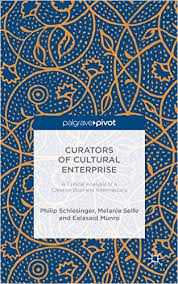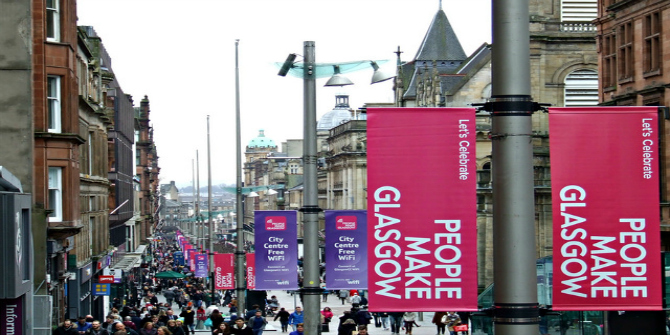Curators of Cultural Enterprise: A Critical Analysis of a Creative Business Intermediary presents a detailed portrait of the Cultural Enterprise Office (CEO), a small Glasgow-based agency that supports creative businesses. Through this case study of a ‘creative business intermediary’, Philip Schlesinger, Melanie Selfe and Ealasaid Munro more widely reflect on recent UK policies relating to the creative economy, in particular ‘micro-businesses’. This book’s unusual methodology – borne of working in productive interaction with CEO – and particular focus on the tensions and interplay between the public and private realms make this essential reading for those involved in the cultural sector, policy-making and creative industries, writes Jonathan Vickery.
If you are interested in this book review, you may also like to listen to a podcast of Professor Philip Schlesinger’s lecture, ‘The Creative Economy: Invention of a Global Orthodoxy’, held at LSE on 25 November 2015, with a response from Professor Angela McRobbie.
Curators of Cultural Enterprise: A Critical Analysis of a Creative Business Intermediary. Philip Schlesinger, Melanie Selfe and Ealasaid Munro. Palgrave MacMillan. 2015.
 This is an unusual book – in its own words, ‘the first-ever detailed portrait of a neglected type of cultural intermediary that has become an inherent part of the creative economy: namely, the type of agency focused on ensuring that cultural micro-businesses have the skills to survive and thrive’ (105). The agency in question is the Glasgow-based Cultural Enterprise Office (CEO), today still offering a range of support services and development inputs to cultural and creative-based ‘micro-businesses’ (currently defined as an individual or business employing less than ten people with a turnover below £1.6 million).
This is an unusual book – in its own words, ‘the first-ever detailed portrait of a neglected type of cultural intermediary that has become an inherent part of the creative economy: namely, the type of agency focused on ensuring that cultural micro-businesses have the skills to survive and thrive’ (105). The agency in question is the Glasgow-based Cultural Enterprise Office (CEO), today still offering a range of support services and development inputs to cultural and creative-based ‘micro-businesses’ (currently defined as an individual or business employing less than ten people with a turnover below £1.6 million).
CEO’s emergence and strategic aims were animated by something of a national mandate to develop Scotland’s creative economy; its consistent struggle for funding and resources has also been a concurrent struggle for political legitimacy (for recognition, to be and remain a productive part of that economy). It remains a moot, if indirect, point in this book’s granular study of the agency’s evolution and operations – do the creative businesses that ultimately ‘survive and thrive’ require public intervention to do so, at least in their early stages of evolution? This book presumes that they do, and quite reasonably also assumes that the ‘public’ should not be categorically divorced from the ‘private’, particularly where the creative economy is concerned.
But of course, one of the fascinating aspects of this book’s six chapters – and its assessment on how CEO managed the twin principal demands of dealing with ‘clients’ on the one side (designers, artists, musicians and so on), and shifting policy contexts, on the other – is the enduring tension between public and private. Faced with the wholesale ‘economisation of cultural life’, Scotland, like all the UK’s cultural jurisdictions, lives with New Labour’s hitherto unchallenged assumption that culture and business can find a happy union and in doing so, provide a common good.
A second unique characteristic of this book – apart from its subject matter – is its methodology. As part of its initial research funding agreement, it took the shape of a productive interaction with CEO with a view to the mutual benefits of ‘knowledge exchange’. As an appendix to the book explains, the researchers were given access to meetings, documents, data and personnel as well as all other kinds of aspects of organisational life usually closed or partially concealed. They come up with a set of interesting observations and insights that characterise the agency as grappling with some intractable questions: how are value judgements made on what to support and what not? How do we bring to bear a rigorous business assessment upon creative processes that operate on the basis of a completely different set of values?
 Image Credit: Buchanan Street, Glasgow (Thomas Nugent)
Image Credit: Buchanan Street, Glasgow (Thomas Nugent)
The backdrop to the book is the common fact that since New Labour, governments Left and Right have wanted to harness and invest in the creative industries, yet for the most part have arguably misunderstood (and misrepresented) both the conditions of creative enterprise incubation and growth and the conditions of cultural work. This book starts with two chapters offering a clear overview of the politics and policies around creative industries, which was always a political investment in a range of issues from youth employment to small businesses to Intellectual Property, particularly motivated by the ever-growing need for increased competitiveness in a global market. The book’s interest, obviously, is Scotland’s policy environment but, as the reader will realise, each issue, problem, challenge and question is now pertinent to thinking about how policies and political interventions in the so-called ‘creative economy’ are operating all over the world, intimately interconnected with other ideologically-loaded terms like ‘knowledge economy’ or ‘digital economy’. How does an agency like CEO devise cutting-edge support strategies for cutting-edge industries that no one really understands, which remain suspended in a state of partial development or are entirely unpredictable?
In one sense, it’s odd that this book does not make more use of contemporary economic theory or organisation studies and entrepreneurship, and so indicate how the actual political coordinates of many of CEO’s challenges stretch way beyond Scotland’s cultural sector to the ways in which the UK has been particularly exposed to the distortions of global capitalism (and because of successive ‘Anglo-Saxon’ responses to it). The reason it does not is focus – and the focus is the function and policy status of the ‘intermediary’. As discussed by Pierre Bourdieu, the economy of cultural production contains more than makers and buyers, and markets do not themselves construct an ‘economy’. Rather, a range of other organisations are required, from agents to service providers, and such ‘intermediaries’ have grown in the public sector all across Europe itself, with a view to providing more favourable conditions for the fast growth, motivation and development of creative enterprise in the profit-making markets, but which, in turn, generate social value and public benefits.
CEO is one such intermediary deeply involved in this circular logic, whose history and development is quite unique, but whose aspirations and professional interventions unfold a panoply of common issues for policy-makers, agents and actors right across the creative economy. There is a sense in which, as successive CEO leaders have been publicly committed to Scotland’s arts and culture as much as enterprise, any such attempt at a politically motivated investment in the creative economy will find itself torn between the needs of the former – the aggressive commodification of cultural intelligence and creativity, the production of Intellectual Property and so on – and the latter – a democratic public and inclusive cultural life for Scotland. The discourse of ‘cultural entrepreneurship’ is one particularly stimulating epiphenomenon of this tense binary.
With an organisational history spanning the last thirteen years, CEO is described in terms of its consistent concern for supporting creative professionals and sustaining close dialogue with their industrial or cultural sectors, yet being stretched to compromise by internal strategy shifts, management philosophies, changing models of consultancy and delivery, partnerships and new approaches to sectoral engagement. While to some extent this is the stuff of management, development and change for any organisation, what makes this longitudinal study compelling is that the multitude of dilemmas experienced by CEO are not only indicative of a policy regime that actually has no intention of truly comprehending the phenomenon of creative economy (from the grand global discourse to the locales of struggling, if passionate, creative labourers), but also that there is (not just in Scotland, but anywhere) no real policy commitment to be found that actually understands the productive role of cultural intermediaries. To quote:
we would argue that as long as well-evidenced effectiveness remains the watchword for government, policy makers and other influential parties, the prevailing conditions for agencies such as CEO – which combine intense competition and extreme precariousness – make little sense (110).
And this account largely remains on the level of a detailed organisational analysis to demonstrate how, despite the good intentions at every level, CEO simply did not find the conditions required to fulfill its mission.
Yet this book by no means characterises the Cultural Enterprise Office as an ineffective failure. The difference the CEO has made to numerous young professionals is not so easily quantified; the book’s analysis is more concerned with its evolving strategy, development and the policy contexts of its public mandate. It is a story worth telling, and the story is not finished yet – the current CEO website is worth looking at, particularly its Vimeo vignettes. This book is thus essential reading for anyone in the cultural sector, policy-making or creative industries.
Dr. Jonathan Vickery is an Associate Professor in Warwick University’s Centre for Cultural Policy Studies. He is Director of the Masters programme in Arts, Enterprise and Development, and is currently involved in research projects on global cultural policies, the impacts of European cultural industries and creative industries in Shanghai. Read more reviews by Jonathan Vickery.
Note: This review gives the views of the author, and not the position of the LSE Review of Books blog, or of the London School of Economics.







